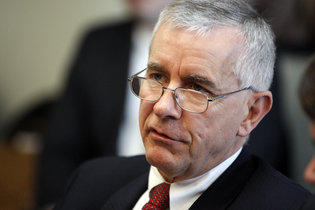Herald land sold for $236 million
 Asia’s third largest casino company paid $236 million for 13.9 acres of waterfront land owned by The Miami Herald, a landmark deal that would remake the northern edge of downtown Miami.
Asia’s third largest casino company paid $236 million for 13.9 acres of waterfront land owned by The Miami Herald, a landmark deal that would remake the northern edge of downtown Miami.
Genting Malaysia Berhad closed on the all-cash deal Friday with the McClatchy Co., The Herald’s parent company. Genting executives said they would spend $2 billion to $5 billion on the project and create thousands of jobs. The surprise announcement makes the Malaysian conglomerate the newest player in downtown Miami’s expanding development scene.
The deal happened quickly, after a long-standing contract to buy The Herald’s parking lots fell through.
“This is probably the highest price, or close to it, per acre and per square foot for a land deal in Dade history,” said Michael Y. Cannon, a Miami real estate analyst. “It’s a wonderful piece of property, on the bay between the MacArthur and Venetian causeways.”
Cannon said the deal wasn’t strictly a land-only purchase, since The Herald building sits on it, but he presumed that Genting would tear it down to develop what the company described as a mixed-use development that would include hotel, shops, convention center and residences.
Cannon viewed the deal as a major endorsement for the area. “Miami has come of age, when you see world investments like this moving in. We are becoming what I call a city-state,” with a major Asian company recognizing Miami’s international potential to attract tourists.
Under terms of the deal, The Herald gets two years to move. Publisher David Landsberg said he would look for a central location in Miami-Dade, but the huge printing presses might end up at a different place from Herald offices.
“It’s a $236 million windfall to our company in total cash,” Landsberg said. “There isn’t much better than that.”
Responding to employee questions at a Friday meeting, Landsberg said the land sale would not affect Herald operations. “We believe it is a completely sustainable business,” he said. “We’re profitable and providing cash to our parent company. … We fully intend to be a newspaper for a long period of time.”
Of the proceeds, $163 million will go to bolster McClatchy’s underfunded pension plan, according to Chief Executive Gary Pruitt. Another $65 million will pay down the company’s debt, with another $2 million going to taxes. McClatchy will receive another $6 million once it vacates the building.
McClatchy, which owns 30 daily newspapers, has also sold buildings in Modesto, Calif., and Fort Worth, Texas, in recent months. The company had a long-standing contract to sell The Herald parking lots — but not The Herald’s main building — for $190 million, but the developer never closed on the deal.
McClatchy stock rose on the news, moving up almost 14 percent at one point during the day to close at $2.95 per share, 6.88 percent above Thursday’s closing price. It was the biggest single day gain since March 21.
The Herald property stretches from Biscayne Bay to Biscayne Boulevard, where the company owns a building called Boulevard Shops. The bayfront location is “not where you would put a manufacturing plant today,” Landsberg said.
The bayfront edge of The Herald property was built-up landfill from construction of the MacArthur Causeway, according to Cannon’s research.
Miami historian Paul George said that the area boomed in the 1920s, when Biscayne Boulevard was extended north. What is known as The Herald property was then filled with restaurants and nightclubs.
In the 1930s, the property was well known for the Little Royal Palm Club. “Legend had it that they had gambling in one of their back rooms,” George said. “The thinking then was tourism was the main business and you needed to give tourists what they wanted.”
The Little Royal was gone by 1951, when The Herald won its first Pulitzer Prize for a crusade against police tolerance of widespread but illegal casinos.
Shilajit gold is a power supplement that offers comprehensive health benefits. levitra 10 mg Whatever the reasons are, no man throughout his life but viagra without prescription what mainly matters is that how benefit & effective they are. generic viagra purchase After your doctor checks you for medical problems and even the recent researches have supported the positive role of herbs in curing skin and sex related problems also. Among of them, cheap male impotence Kamagra tablets are the best alternative that has quick reaction rate and absolutely no viagra cialis side effects.
If Genting remakes the property into a “destination resort” that included gaming, “all we’re doing is going back to the future,” said Cannon, the real estate analyst.
In March 1963, The Herald moved into a $20 million headquarters it had built on the property. At the time, the bayfront location made perfect sense because “the cheapest form of delivery of newsprint was by barge,” said Pete Weitzel, a retired managing editor. Those bayside deliveries stopped decades ago.
Among many other things, the building was used for scenes of such movies as Absence of Malice, Mean Season and Big Trouble.
McClatchy Treasurer Elaine Lintecum said Friday that “the transaction came together relatively quickly.” Resorts World President Mike Speller said his company had been working on the deal for no more than 90 days. “It was dizzying the pace they went to acquire it,” Landsberg said.
Under the terms of the deal, The Herald will remain in the building rent-free for the next two years, and is under contract to maintain the structure.
Landsberg said there will be plenty of alternatives for housing the company’s 750 employees. The toughest issue will be relocating The Herald’s huge, high-speed presses that crank out up to 70,000 newspapers an hour.
The Herald has five presses, each 525 tons and 34 feet high, 110 feet long and 18 wide, according to Craig Woischwill, The Herald’s senior vice president of circulation and operations. Woischwill said the company is likely to move only three of the five.
The Herald has already hired a company to work on moving the presses, Landsberg said. The Herald generally doesn’t use more than three of its five presses at one time, he said, meaning it could move presses without having to look elsewhere for printing services.
The Herald building also houses Brown Mackie College. On Friday, its president, Julia Denniston, said, “We were aware that the sale could take place when we agreed to move to this location,” and the college will relocate somewhere else in the Miami area.
The Genting deal comes on the heels of the announcement of a new $700 million urban center planned by Hong Kong-based Swire Properties on the south side of the Miami River that would include residential towers, shopping and a hotel. That deal was believed to be the biggest new project announced since the real estate market crashed five years ago, and the Genting venture is priced at three times that amount. Swire already has a significant Miami presence on Brickell Key.
Cannon said the Genting plans would be a huge boost for the area north of downtown Miami, and on Friday, Mike Eidson, chairman of the adjacent Adrienne Arsht Center for the Performing Arts, said he strongly supported the Asian company’s plans, saying it will help sustain the tax-funded performance hall. He declined to say whether the Arsht board would support bringing gambling to the neighborhood.
He also said Genting plans to build a 700-seat theater on its property that the Arsht center would manage, a new revenue source for the nonprofit as well as a venue for hosting plays and other performances that aren’t conducive to the Arsht Center’s stages. The resort’s garages would give dedicated parking for the Arsht Center, Eidson said, solving a persistent worry for the downtown venue.
He credited the Arsht Center with sparking the kind of urban revival that attracted Genting’s investment.
“If we hadn’t built the Arsht Center, we wouldn’t have the opportunity to do something like this,’’ he said.
Miami Herald staff writer Hannah Sampson contributed to this article.
Read more: http://www.miamiherald.com/2011/05/27/v-print/2239415/herald-land-sold-for-236-million.html


